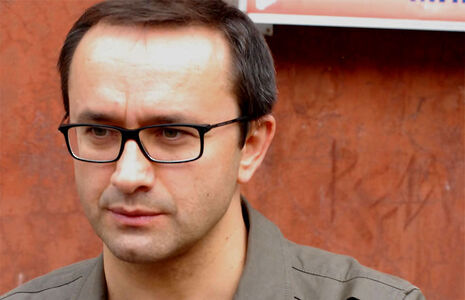Film: Leviathan
Leo Sands recommends a visit to the Picturehouse to see this highly complex Russian movie

Fresh from the big screen at Cannes (Best Screenplay 2014) to the Arts Picturehouse on St Andrew’s Street, Zvyagintsev’s (that Russian director, right?) Leviathan is a masterful movie that manages to impressively weave together the Biblical, the Hobbesian, and the Russian into just over two hours.
Set on the Northern coast of Putin’s Russia, Leviathan tells the story of Kolia (Serebriakov), a small-town mechanic, wrangling within an asphyxiating web of corrupt Russian bureaucracy, embodied in Vadim (Madyanov), the grotesque but thrilling local mayor, whose bloodshot eyes watch over and greased paws hover menacingly above the windswept coastal property occupied by Kolia’s dilapidating house and family.
Alongside unmoveable wife Lilya (Lyadova) and old friend turned elegant Moscovian lawyer Dimitri (Vdovichenkov), the trio take on the mayor and his obedient army of local government administrators and violent henchmen in a conflict shot through with vodka. This conflict is about something that stretches far beyond their small peninsula veering out into the Barents Sea. Replete with biblical references, particularly to the Book of Job (that one asking "why do the righteous suffer?"), and also Hobbes’ Leviathan whale itself, the tragedy and human suffering portrayed in this film resonates with a sense of timelessness that harks back to before any of us could possibly remember. Did I mention that it’s not really light viewing?
However, as well as being transcendent, Leviathan still works as a pointed and political piece of cinema. Both its title and plot nod to Hobbes’ notorious work on statecraft – imploring the individual to submit their liberty to the state in an exchange for a promise of security. Through Kolia’s seemingly unwinnable battle, Zvyagintsev is able to transpose that eternal struggle of the individual versus the state into a distinctly current and Russian context.
In an ironic extension of this theme, the Russian government seems not to have been able to make up its mind on the film. Despite having been partly funded by its Ministry of Culture, the movie was then denied a Russian screening permit following the beefing up of public obscenity laws in July of this year. What Zyvagintsev does so well, however, lies in the subtlety with which this central struggle is portrayed, which although at the core of the film, seems still almost periphery to the flaws and realism of the characters who play it out so well.
 Comment / Plastic pubs: the problem with Cambridge alehouses 5 January 2026
Comment / Plastic pubs: the problem with Cambridge alehouses 5 January 2026 News / Cambridge businesses concerned infrastructure delays will hurt growth5 January 2026
News / Cambridge businesses concerned infrastructure delays will hurt growth5 January 2026 News / New movement ‘Cambridge is Chopped’ launched to fight against hate crime7 January 2026
News / New movement ‘Cambridge is Chopped’ launched to fight against hate crime7 January 2026 News / AstraZeneca sues for £32 million over faulty construction at Cambridge Campus31 December 2025
News / AstraZeneca sues for £32 million over faulty construction at Cambridge Campus31 December 2025 Interviews / You don’t need to peak at Cambridge, says Robin Harding31 December 2025
Interviews / You don’t need to peak at Cambridge, says Robin Harding31 December 2025









